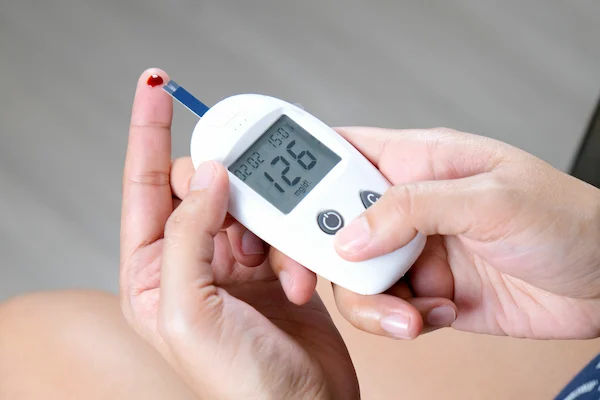Pomegranate And Diabetes: Are They Good For Managing Blood Sugar?
Explore the relationship between pomegranates and diabetes. Learn how this fruit may help manage blood sugar levels and support overall health.

Written by Dr Sonia Bhatt
Last updated on 13th Jan, 2026
Diabetes is a chronic condition affecting millions worldwide, characterised by high blood sugar levels due to the body's inability to produce or effectively use insulin. Managing this condition requires a holistic approach, including a balanced diet, regular exercise, and medication for preventing complications and improving overall health. One fruit that has garnered attention for its potential benefits in diabetes management is the pomegranate. Known for its vibrant colour, sweet-tart flavour, and a plethora of health benefits, pomegranate may be a valuable addition to a diabetic-friendly diet. This article delves deep into the nutritional profile of pomegranates, their potential benefits for diabetics, and how to incorporate them into your daily diet.
Nutritional Profile of Pomegranate
Pomegranates are a nutrient-dense fruit, offering a variety of vitamins, minerals, and antioxidants. Here’s a detailed breakdown of the nutritional content for a 100g serving of pomegranate seeds (arils):
Macronutrients:
Calories: 83 kcal
Carbohydrates: 18.7 g
Sugars: 13.7 g
Dietary Fiber: 4 g
Protein: 1.7 g
Fat: 1.2 g
Vitamins:
Vitamin C: 10.2 mg (32% of the Daily Value)
Vitamin K: 16.4 µg
Folate: 38 µg (27% of the Daily Value)
Vitamin E: 0.6 mg
Vitamin B6: 0.075 mg
Thiamine (Vitamin B1): 0.067 mg
Riboflavin (Vitamin B2): 0.053 mg
Niacin (Vitamin B3): 0.293 mg
Minerals:
Potassium: 236 mg (13% of the Daily Value)
Phosphorus: 36 mg (8% of the Daily Value)
Magnesium: 12 mg (8% of the Daily Value)
Calcium: 10 mg
Iron: 0.3 mg
Zinc: 0.35 mg
Antioxidants:
Pomegranates are particularly rich in polyphenols, including:
Ellagitannins: such as punicalagins, which are potent antioxidants.
Anthocyanins: responsible for the red colour of pomegranates and possess strong antioxidant properties.
How Pomegranates Affect Blood Sugar Levels
One of the primary concerns for people with diabetes is how certain foods will impact their blood glucose levels. The glycemic index (GI) is a measure that ranks foods according to their effect on blood sugar levels. Pomegranates have a relatively low glycemic index, typically around 35, meaning they cause a slower and more stable rise in blood sugar compared to high-GI foods.
Studies have shown that pomegranate juice may improve insulin sensitivity and reduce blood sugar levels. This could be attributed to the fruit's unique combination of natural sugars and antioxidants. The polyphenols in pomegranates help protect pancreatic cells, enhance insulin secretion, and reduce oxidative stress, all of which are beneficial for managing diabetes.
Health Benefits of Pomegranates for Diabetics
Incorporating pomegranates into a diabetic-friendly diet offers numerous benefits:
Antioxidant Properties: Pomegranates are loaded with antioxidants that help combat oxidative stress, a common issue in diabetes. This can lead to better blood sugar control and reduced risk of complications.
Anti-Inflammatory Effects: Chronic inflammation is a significant factor in the progression of diabetes and its complications. Pomegranates' anti-inflammatory compounds help mitigate this inflammation, promoting better overall health.
Heart Health: Diabetics are at a higher risk of cardiovascular diseases. Pomegranates contribute to heart health by lowering cholesterol levels, improving blood pressure, and enhancing arterial health.
Weight Management: Maintaining a healthy weight is vital for diabetes management. Pomegranates are low in calories but high in fibre, which can help with satiety and weight control.
How to Include Pomegranate in Your Diabetes-Friendly Diet
Pomegranates are versatile and can be easily incorporated into a variety of meals and snacks. Here are some ideas for including this nutritious fruit in your diabetes-friendly diet:
Pomegranate Seeds as a Snack: Pomegranate seeds, also known as arils, can be added to a variety of dishes. Sprinkle them on salads, yoghurt, oatmeal, or even rice dishes for a burst of flavour and nutrients. They can also be eaten on their own as a healthy snack.Salads: Add fresh pomegranate seeds to salads for an extra burst of flavour and nutrients. Pomegranate pairs well with leafy greens, avocado, and lean proteins like tofu.
Smoothies: Blend pomegranate seeds with other low-GI fruits, such as berries or apples, and a source of protein like Greek yoghurt or almond milk to create a delicious and filling smoothie.
Pomegranate Juice: If you prefer pomegranate juice, choose 100% pure juice with no added sugars. Limit your serving size to about ½ cup (120 mL) to avoid excess sugar. To reduce sweetness and make it more hydrating, you can dilute the juice with water. For the most benefits, however, consider eating the whole fruit, as it provides the added advantage of fibre, which supports better blood sugar regulation.
Pomegranate on Oatmeal or Yogurt: Top your morning oatmeal or Greek yoghurt with pomegranate seeds for added texture, flavour, and nutrients. Pair it with a handful of nuts for a well-rounded breakfast.
Precautions and Considerations
While pomegranates offer numerous health benefits, it’s crucial to consume them in moderation, especially for those managing diabetes. Here are a few considerations to keep in mind:
Monitor Blood Sugar Levels: As with any new food, monitor your blood sugar levels after consuming pomegranates to understand how they impact your body. This is particularly important when consuming pomegranate juice, which can cause a more rapid increase in blood sugar levels.
Consult Your Healthcare Provider: Always consult with a healthcare provider or a dietitian before making significant changes to your diet. They can provide personalised advice based on your unique health needs and conditions.
Consider Portion Sizes: While pomegranates are nutritious, they still contain natural sugars. Pay attention to portion sizes to avoid consuming too many carbohydrates in one sitting.
Check for Allergies: Although rare, some individuals may have allergic reactions to pomegranates. If you experience any adverse reactions, discontinue use and consult a healthcare professional.
The Controversy
Pomegranates are often hailed as superfruits, packed with antioxidants and nutrients that offer numerous health benefits. However, when it comes to managing blood sugar levels for diabetics, the evidence is mixed, and there are some controversies to consider.
Mixed Research Findings: While some research suggests that pomegranate juice can improve insulin sensitivity and lower blood sugar levels, other studies have found no significant impact. The inconsistency in results highlights the need for more comprehensive research to understand the full effects of pomegranate on glucose management.
Glycemic Index Concerns: Although pomegranates have a low glycemic index (GI), meaning they cause a slower rise in blood sugar, consuming them in large quantities can still lead to blood sugar spikes. Portion control is essential to avoid these spikes.
Juice vs. Whole Fruit: Pomegranate juice, while convenient, often lacks the fibre found in the whole fruit. Fibre is crucial for slowing down sugar absorption and promoting better blood sugar control. Therefore, eating the whole fruit is generally more beneficial than drinking the juice.
Potential for Added Sugars: Many store-bought pomegranate juices contain added sugars, which can negate the potential benefits of the fruit. It's important to choose 100% pure pomegranate juice without any added sugars.
Conclusion
Pomegranate is a delicious and nutritious fruit that can be part of a diabetes-friendly diet. With its low glycemic index, high fibre content, and rich antioxidants, pomegranate can help stabilise blood sugar levels, reduce inflammation, support heart health, and promote digestive health. As with any food, it’s essential to monitor portion sizes and avoid overconsumption, especially of pomegranate juice, which can be high in natural sugars. If you have any concerns or specific dietary needs, consulting with your healthcare provider or a registered dietitian is always a good idea to create a meal plan that works best for you.
Consult Top Endocrinologists
Consult Top Endocrinologists

Dr. Anand Ravi
General Physician
2 Years • MBBS
Bengaluru
PRESTIGE SHANTHINIKETAN - SOCIETY CLINIC, Bengaluru

Dr. E Prabhakar Sastry
General Physician/ Internal Medicine Specialist
40 Years • MD(Internal Medicine)
Manikonda Jagir
Apollo Clinic, Manikonda, Manikonda Jagir
(150+ Patients)

Dr. Shiva Madan
Endocrinologist
10 Years • MBBS , MD (General medicine) , DM (Endocrinology)
Bikaner
Sushma diabetes and Endocrine center, Bikaner

Dr. Mary Susan K S
General Physician/ Internal Medicine Specialist
13 Years • MBBS, MD INTERNAL MEDICINE
Bengaluru
Apollo Clinic, Sarjapur Road, Bengaluru
(25+ Patients)

Dr. Shruthi B
Endocrinologist
20 Years • MBBS,MD ( GEN MED) DM (ENDOCRIONOLOGY)
Bengaluru
Apollo Clinic, JP nagar, Bengaluru




